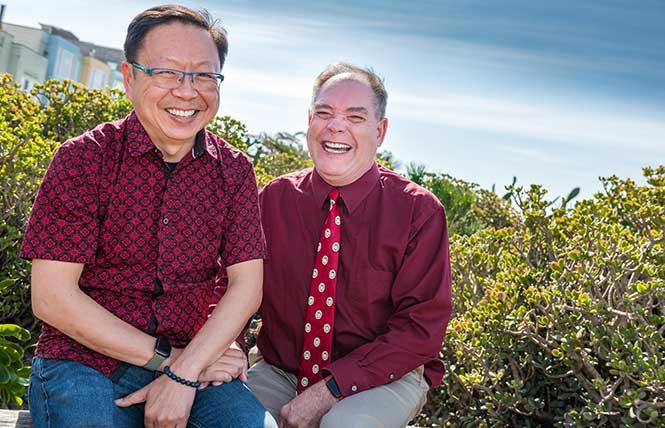By David-Elijah Nahmod | The Bay Area Reporter
For Amos and Mickey Lim, a married gay couple who live with their 14-year-old daughter in San Francisco, the road to love was filled with challenges.
Amos Lim, 52, is an immigrant from Singapore where it’s not easy to be gay. Mickey Lim, 58, is white. The couple met online in 1995.
“I think I reached out because I was living in Singapore and was struggling with being gay,” Amos Lim recalled. “I saw a post that said the reason there’s no love in gay relationships is that we don’t have role models, and Mickey replied saying that’s not true, that there was a couple that just released their book called “Straight From the Heart.” So I emailed him asking if he would mind getting me the book because it would probably be banned in my country.”
“Straight from the Heart: A Love Story”(1995) was written by Rod and Bob Jackson-Paris and was one of the first books by a gay couple in the national spotlight. Bob Jackson-Paris was a body-builder and Rod Jackson-Paris was a former Playgirl Man of the Year.
That online reply from Mickey Lim was the beginning of their relationship. They met in person in 1997 when Mickey Lim visited Singapore. Thirty minutes after the meeting they knew they were meant for each other. At first Amos Lim struggled to get a visa to come to the United States, but he finally got an education visa in 1999 and came to attend school.
“And the rest is history,” he said.
Amos says that gay life in Singapore was non-existent, unless one went to bars or sex clubs regularly which was risky because the police might raid the club and arrest people.
“Things have changed in the last 20 years,” he said. “When I went back in March, more people were out on the streets. We have an annual Pride event called Pink Dot. But I don’t have any rights as an LGBT person in Singapore, not even to get a spousal visa (for Mickey) to come and live with me in Singapore.”

By contrast, they own their home in San Francisco. Like any couple, they occasionally argue but love each other dearly. They said their families are supportive of their relationship.
“We exchange messages when we work saying ‘I love you. We check in every day when we’re away from each other. We’re happy,” said Mickey Lim.
Both have good jobs. Mickey Lim is a pharmacist at Zuckerberg San Francisco General Hospital and Trauma Center. Amos Lim works in the economic justice program at the nonprofit Chinese for Affirmative Action. His duties include helping limited English-speaking Asians look for jobs and improve their skills, and to advocate for them when laws are introduced that impact them.
The couple has experienced the increase in anti-Asian hate in recent years. In June, Attorney General Rob Bonta released the state’s annual hate crimes report that saw reported incidents increase by 32.6% over 2020-21. The number of hate crimes against Black people were still the most frequent overall with an increase of 12.5% but hate crimes against Asians “increased dramatically” by 177.5%. Hate crimes against LGBTQ+ people increased by 47.8%.
Mickey Lim recalled a time when their daughter, then aged 2-3, was having a meltdown at a party. Amos Lim took the girl out into the lobby.
“Someone comes up and says, ‘Should I be concerned?’” Mickey Lim recounted. “Should they be concerned about what? With a white, blonde girl and an Asian man and she’s having a fit. And Amos said, “She’s my daughter.”
“I’m used to it,” said Amos Lim. “The verbal is easier because you can react or reply or address it. It’s more the stares when you go to the grocery store, and you’re walking with your 2-year-old white haired daughter that doesn’t look like you and they’re either following you or tracking you or checking back to make sure things are OK. At first it was disconcerting, but after a while I ignore it because I get it all the time.”
Amos Lim added that while he’s never been subjected to violence, their house has been egged four times.
“The truth is that if it was just adults here with no kids, I’d be less worried because I know I can take care of myself,” he says. “But now we have a kid, I’m more worried that the information I put out identifies where I live.”
Amos Lim added that it’s important when subjected to a hate crime to report it to authorities. “There are victim compensation services available at the district attorney’s office,” he said. There are websites and organizations which collect data about AAPI hate. So it’s important that whatever incident happens to you be reported so that somebody knows about it. If you don’t report it then people will assume that it doesn’t happen.”
Amos Lim tried to relax after the incidents that happened to the couple by taking walks on the beach, but after the anti-AAPI incidents began, he stopped, saying that he didn’t feel safe.
“Anything can happen,” said Mickey Lim. “That’s always embedded in the fear and I see that in him and there’s nothing I can do about it.
“Hate is toxic,” MIckey Lim added. “It serves nothing. However evil you are, it’s a rabbit hole.”
“It takes so much more energy to hate than to love,” added Amos Lim.
This article is part of the Love Across Colorlines series, a collaboration of 20+ ethnic media outlets looking at interracial marriage in California at a time of rising hate. Visit Love Across Colorlines to see more in the series.





